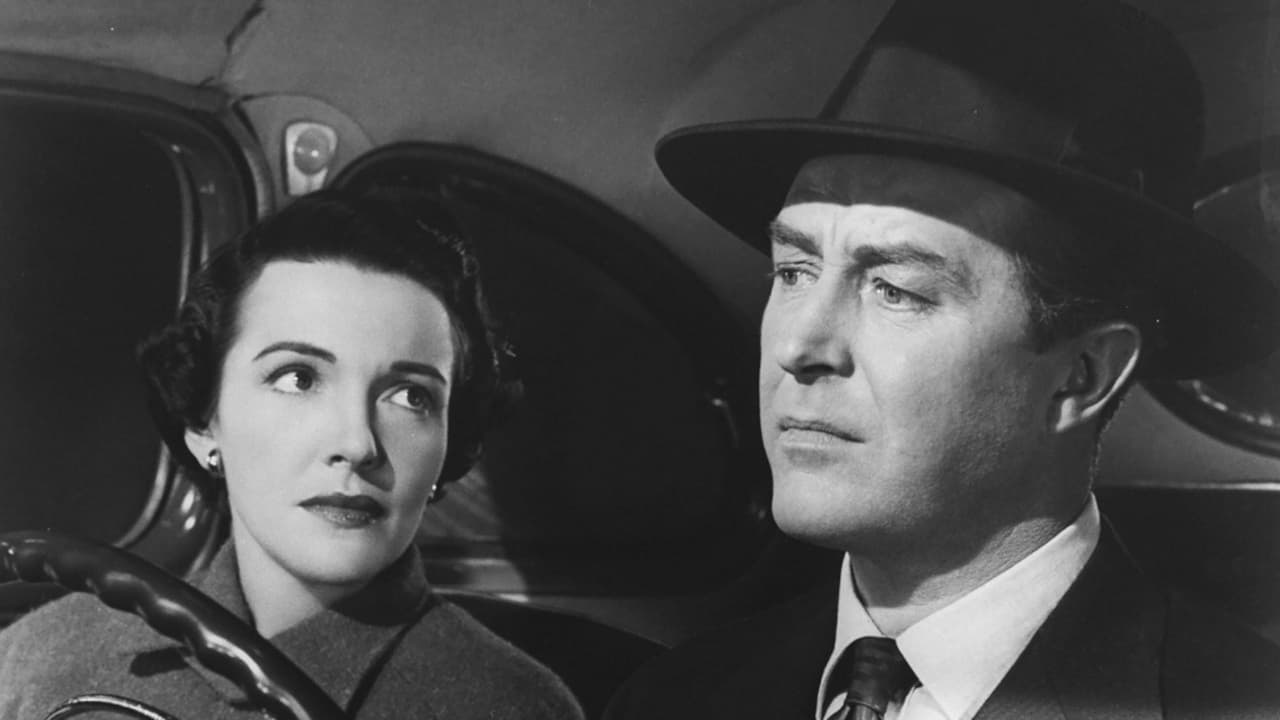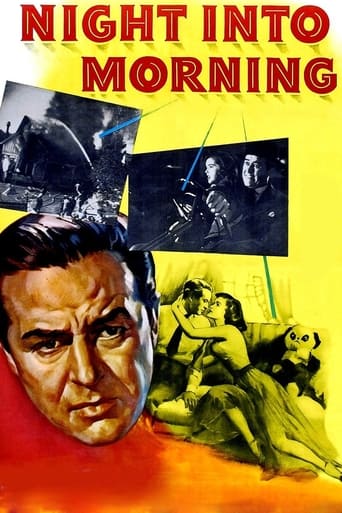Greenes
Please don't spend money on this.
CrawlerChunky
In truth, there is barely enough story here to make a film.
Merolliv
I really wanted to like this movie. I feel terribly cynical trashing it, and that's why I'm giving it a middling 5. Actually, I'm giving it a 5 because there were some superb performances.
Asad Almond
A clunky actioner with a handful of cool moments.
edwagreen
Ray Milland had plenty of experience coming off as a drunkard in this 1951 film from his 1945 Oscar winning performance in "The Lost Weekend."As an English professor, College secretary Nancy Davis, runs in to inform him in front of the class that his house exploded. Of course, in this type of situation, he would have been called out privately. He is devastated by the loss of child and his wife.Milland is again terrific as always. While he descends into heavy drinking, he is still able to maintain his position, though he becomes an embittered and quite nasty at times. As the secretary who is sympathetic to his plight, because she lost her husband to World War 11, Nancy Davis is marvelous here and it's probably by far the best performance she has given on screen. John Hodiak plays a member of the faculty who is involved with Davis, but feels threatened by her overly sympathetic embrace of the Milland character.It is only when he is involved in a car accident helped by his not being sober does Milland come to grips with the problem and speaks in a memorable way to his outgoing class at term's end.
jacksflicks
The fifties were pretty alcohol-soaked. World War II had both scarred the collective psyche and ended the Great Depression. The Korea had turned the Cold War hot. Alcohol was the self-medication of choice. It was also just fun, and fun was what filled the leisure that American prosperity had brought the masses.Yet, this was no longer the era of Nick and Nora Charles or Robert Benchley, when being drunk was cute or comic. So, when imbibing America needed a cautionary tale, Ray Milland was the right protagonist, as he proved in The Lost Weekend. Night into Morning isn't about alcoholism per se but about the response to a horrible tragedy. Lost Weekend was about alcoholism as a lifestyle. Night into Morning is about a binge that is carrying Milland over a precipice. The casting is flawless. Milland, like Holden, has this seemingly easy way of acting. By being himself, he is the part. I like Nancy Davis better with every new viewing. What I used to regard as wooden, I now see as measured, kind of like the great Anne Revere. Here she's quite believable as a voice of reason, a voice on our behalf, responding to Milland's woes as we should. And then there's John Hodiak. What can I say? He died so young that everything he was in becomes precious. And this may be one of his best performances, as Milland's best friend and colleague. Hodiak may have been pushed aside when the big stars returned from WWII, but for me he still chews up the scenery. The looks, the voice. It just occurred to me that had Hodiak survived he might well have settled into a Lloyd Nolan career. Dawn Adams gets good screen time as the girlfriend of the lug whom Professor Milland is going to flunk. The bit parts are not neglected. Whit Bissel has a great little turn as a headstone salesman. The cocktail waitress/student appealed to me a lot, and it turns out that Mary Lawrence playing her was 32 at the time!Aside for the casting, the production is first-rate. There was a trend in the era for location shooting. In this case, Berkeley gets to play the college town, with a long sequence with Davis and Hodiak on campus, and a scene from the Tower. There's also a bang-up crash scene, though by necessity back at the studio.There are a couple of problems that preclude perfection. There's a a connection with elderly neighbors that doesn't go anywhere. It was great to see Jean Hagan, but her part should have been developed more, in place of the useless footage of the elderly neighbors. Night into Morning ends with what, to today's ears, seems a corny send-off, "Go with God". As a product of its time, it's not so corny. War hangover, the Holocaust, The Bomb, atheist Communism ginned up by McCarthyism, and the rat race. Plus ordinary misfortune that's always hitting someone, somewhere -- sooner or later you or me. Or just plain ennui. It seems that movies like Lost Weekend, Night into Morning, The Man in the Grey flannel Suit, are appealing to contemporary audiences to use faith and friendship instead of fixes. It's no coincidence that at the same time AA was getting noticed for sending this message.
JohnHowardReid
With an unusually moody script by Karl Tunberg and Leonard Spigelgass, this must be one of the gloomiest films ever made! Admittedly, it's well directed by Fletcher Markle, although Ray Milland's portrayal of the bereaved professor is somewhat overwrought. On the plus side, the screenplay is more literate than the usual Metro-Goldwyn-Mayer offering and Markle does ensure that the atmosphere of a small university town is effectively conveyed. The support cast led by John Hodiak and Nancy Davis is fine, and it's good to Lewis Stone, Dawn Addams, Jean Hagen and company. Also helpful for creating the right ambiance are the sets created by art director, James Basevi. The use of the clock tower as a recurring symbol is dramatically presented with fine aerial photography and eye-catching camera set-ups. Also unusual by M-G-M standards is the use of off-screen sound effects in the fire sequence – a notion by writers Karl Tunberg and Leonard Spigelgass that is chillingly effective.
Neil Doyle
RAY MILLAND is a troubled professor who seems to be wallowing in self-pity shortly after the death of his wife and son in a house fire. He begins to scare people with his brusque behavior, both in and out of the classroom. NANCY DAVIS and JOHN HODIAK are sympathetic friends who offer him loyal support--but nobody seems able to help Milland who seems to want to spend more time with the bottle than anything else.The self-pity angle goes on for too long to make Milland's character likable, although his acting is quietly underplayed and altogether believable. "I know you want to help me. Most people do, but you can't," he tells Davis who had to get over her own sense of loss in the past. Davis is full of platitudes and is almost too nice, but she too plays her role well, as does Hodiak.This goes on for the first hour and the main interest in the story is to see how and when Milland will snap out of it. Toward the end of the film he's still telling a waitress, "Find me a glass without a hole in the bottom." It takes a student athlete unable to pass one of Milland's exams that sets the plot on a final course wherein a driving accident lands him in jail and on probation. But Milland's change of heart enables him to give the flunking college student (JONATHAN COTT) another chance to pass, which he does, and he goes about setting in motion his final will, leaving his kid's bike to the boy's best friend. What happens after that, is quite predictable, but once again it's Nancy to the rescue.Honest telling of a troubling tale of a man attempting to solve his problems with alcohol. Nowhere as engaging or powerful as Milland's most famous film, THE LOST WEEKEND, but a modestly successful drama on its own merits.

